The 6 Best Tortilla Presses, According to the Pros
Dotdash Meredith and Yahoo Inc. may earn commission or revenue on some items through the links below.
Our favorite is the Victoria 10-Inch Commercial-Grade Cast-Iron Tortilla Press.
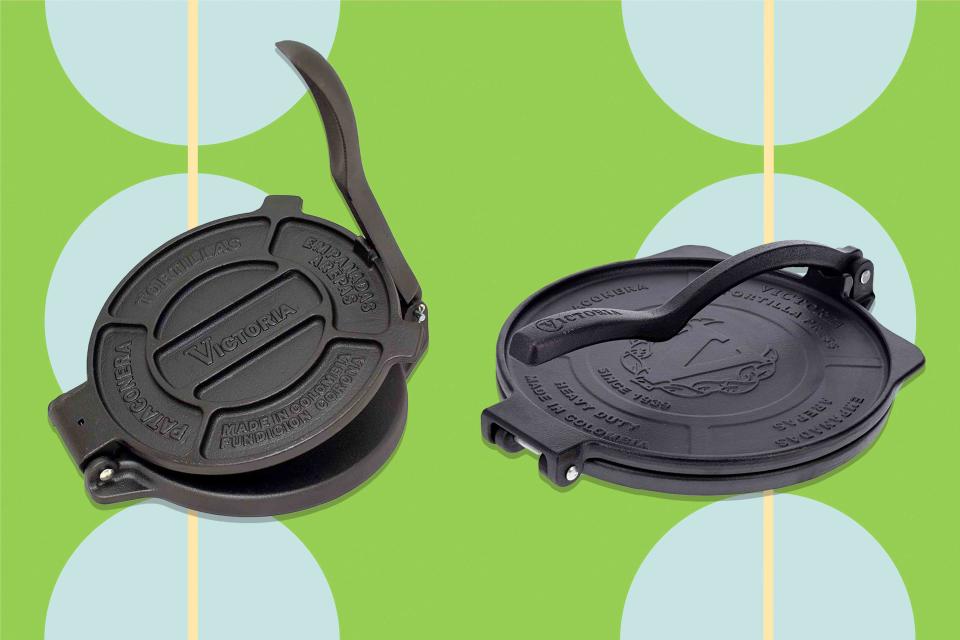
Courtesy of Retailers / Photo Illustration by Kristin Kempa for Food & Wine
While store-bought tortillas do the trick, there’s nothing quite like the taste of a freshly made tortilla. Rather than relying on whatever packaged options are available at the grocery store, using a tortilla press means you can customize them to your ideal size and thickness while saving yourself from putting in that extra elbow grease rolling tortillas out by hand. Whether you prefer corn or flour tortillas, this kitchen gadget will take your tacos, burritos, enchiladas, and quesadillas to the next level.
Considering important factors like size, material, weight, and ease of cleaning, we researched and found the best tortilla presses you can buy online. Keep reading to learn about the pros and cons of all our top picks, including our all-around favorite: the Victoria 10-Inch Cast Iron Tortilla Press.
Victoria 10-Inch Cast Iron Tortilla Press
Best Overall
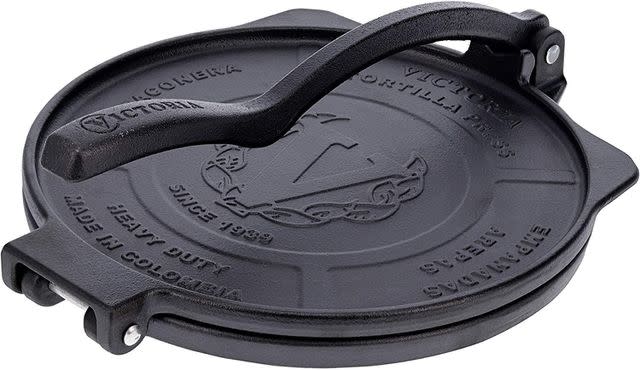
Pros: This tortilla press is easy to use, ergonomic, and built to last.
Cons: Cleaning the tortilla press isn’t hard but does require a few steps, and it’s fairly heavy.
Made from durable, proprietary Spherrous iron, this tortilla press is heavy-duty. It’s produced in a family-owned factory in Colombia, and it’s the kind of long-lasting cookware you could pass down from generation to generation since it’s resistant to breakage. The ergonomic, curved handle makes it easier to push down while you’re working; overall, the tortilla press requires minimal effort to flatten the dough.
This tortilla press comes seasoned with flaxseed oil, and its textured surface helps retain that seasoning. Its textured surface and cast-iron material require a few special steps to keep it looking great, albeit they’re simple steps. Per the manufacturer’s instructions, you should wipe down the press with a dry or oiled towel, clean it with hot water and a brush, and then rinse and dry it thoroughly. Finally, you’ll need to oil it lightly with vegetable oil and wipe it dry with a paper towel. It may sound like a lot, but it’s not compared to how long it can last if you treat it right.
Price at time of publish: $86
Diameter: 10 inches
Weight: 10.5 pounds
Material: Cast iron
Seasoned: Yes
Victoria 8-Inch Cast Iron Tortilla Press
Best Value
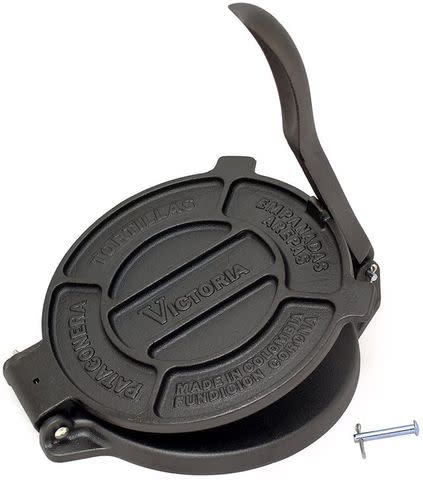
Pros: It’s little investment for great results with this durable, more compact tortilla press.
Cons: You’ll have to be okay with following the specific upkeep instructions and the heavier weight.
This tortilla press is made by the same brand as our top pick but has two differences: It’s two inches smaller in diameter and constructed of regular cast iron (not the company’s trademarked iron). All of that comes together to make this press far more affordable and a great option for those new to at-home tortilla making.
While not light by any means, its smaller size means it’s not as heavy as the 10-inch version, yet you still get the heavy-duty construction that makes it dependable and long-lasting, plus that signature, slightly curved handle designed for ease of use. To make sure your press stays clean and doesn’t rust, you’ll have to put in some extra effort with cleaning, fully drying, and then oiling it — same as with its bigger version.
Price at time of publish: $29
Diameter: 8 inches
Weight: 8.9 pounds
Material: Cast iron
Seasoned: Yes
Doña Rosa x Masienda Tortilla Press
Best Splurge
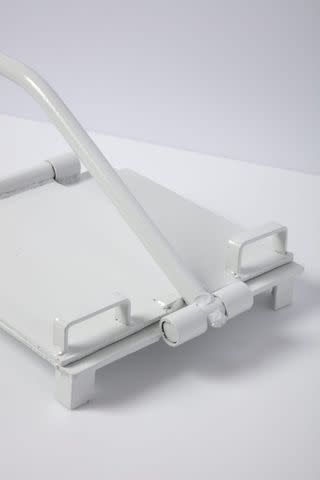
Pros: You can customize your tortilla’s thickness with this versatile, thoughtfully designed, handcrafted press that comes in different colors.
Cons: You’ll need to watch out for sharp edges and corners and potential paint wear.
There’s an artisanal component to this modern-looking tortilla press since it's handmade in Mexico (the eponymous Doña Rosa in Oaxaca produces her presses only for Masienda), which helps justify the splurge. It comes in three different color options — white, seafoam green, and black — and a little personalization is always a plus in our book.
It’s not just this tortilla press’s looks that’ll win you over, though. One of its best features is that it’s calibrated in such a way that you can control the thickness, offering you a lot of flexibility with your tortillas and other creations like dumpling wrappers. We also love the thought that went into adding the two handles on either side of the level for easy gripping and opening. When using, keep an eye out for any sharp corners or edges left from its construction, and you also may start to see paint wearing down in areas of high contact like the press lever.
Price at time of publish: $95
Diameter: 9.5 x 8.75 inches (presses tortillas up to 6.5 inches in diameter)
Weight: 10.4 pounds
Material: Powder-coated, hot-rolled steel
Seasoned: No
RELATED: The 8 Best Crepe Makers of 2023
Verve Culture Tortilla Press
Best Authentic

Pros: This vibrant tortilla press is easy to clean and comes with a bonus napkin and a recipe booklet.
Cons: It’s best for making smaller tortillas.
Coming in a lovely bright red, this sturdy tortilla press is handmade by Mexican artisans using 100% recycled cast iron. It’s the smallest in size of the ones on our list, which could be a plus if you don’t have much space at home or a negative if you want to make large tortillas. However, it’s an excellent choice for street taco tortillas.
While the tortilla press is the star of the show, it’s nice that this kit comes with a pretty, handmade napkin for keeping your freshly made tortillas warm until it’s time to eat plus a booklet with recipes for extra inspiration. When you’re done using the press, it’s a breeze to clean and maintain given its smooth, powder coating (which is FDA-approved).
Price at time of publish: $48
Diameter: 6.5 inches
Weight: 4 pounds
Material: Powder-coated cast iron
Seasoned: No
Central Coast Woodworks Hardwood Tortilla Press
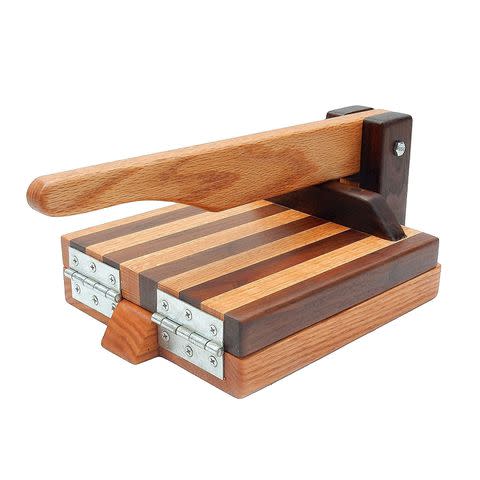
Pros: This beautiful, artisan-made press gets the job done and looks great on the counter in the meantime.
Cons: It’s not as good for making tortillas with flour containing gluten.
There’s craftsmanship and solid construction in this tortilla press, which is made using two types of wood — red oak and walnut. The dual tone provides an attractive design that any cook would want to display in their kitchen.
If you’re all about corn tortillas, then you’ll be happy with this press and its consistent results. But if you prefer flour tortillas (or flour roti or chapatis), you may find that things can get sticky, and you can't press as thin as you’d like using this specific device. You could always finish them off with a rolling pin, though.
Price at time of publish: $90
Diameter: 8 inches
Weight: 6 pounds
Material: Red oak, walnut, and stainless steel
Seasoned: No, but treated with food-grade mineral oils and beeswax
Brentwood Electric 10-Inch Tortilla Maker

Pros: This one’s a real time-saver since you can press and cook your tortillas in one go, and then clean-up is a cinch too.
Cons: There’s a slight learning curve to prevent the dough ball from sliding out.
Can’t resist a good gadget? Featuring a similar design to a waffle maker, this electric tortilla maker does double duty, pressing the dough down for you and then cooking it. You can control how long you want your tortilla to cook (and ultimately brown) using the six-setting knob on top of the device. You may be surprised by how quickly it all works, and it saves you that extra step of cooking your flattened dough on the stovetop.
Depending on what kind of dough you’ve made and where you’ve placed it on the plate, there can be an issue with it slipping out when you close the lid, but avoiding that is something you should get the hang of over time. When you’ve wrapped up your tortilla-making, cleaning the device is quite simple: Just wipe down all the parts.
Price at time of publish: $70
Diameter: 10 inches
Weight: 4.6 pounds
Material: Brushed stainless steel and aluminum
Seasoned: No
RELATED: The 7 Best Mini Food Processors for Salsa, Sauces, and Spreads
Our Favorite
We love the Victoria 10-Inch Commercial-Grade Cast-Iron Tortilla Press for its functionality, durability, and usability. The Doña Rosa Tortilla Press comes in as a close second due to its cool design and ability to adjust tortilla thickness.
Factors to Consider
Size
There is a lot of variation when it comes to the size of tortilla presses, with many falling between 6 inches and 12 inches in diameter. Monica Richards, the Beverage Director and Chief Marketing Officer at Picos in Houston, says that a tortilla press anywhere from 10 to 12 inches in diameter leaves you plenty of space to press out your tortillas. Luisteen Gonzalez, the Founding Chef of Puesto in San Diego, says that his ideal size for a tortilla press is 7 inches in diameter so he can get a consistent 5-inch tortilla. What you decide on ultimately depends on what kinds of tortillas you want to make, and possibly how much storage space you have.
Material
Tortilla presses are commonly made of cast iron, wood, stainless steel, or aluminum. Cast iron presses are very durable, quite heavy, and may require seasoning. They can come with different types of coating, including powder coating. Wooden tortilla presses are often available in larger sizes, and the quality will depend on what kind of wood is used (hardwoods are preferred to softwoods for longevity). Aluminum tortilla presses may be lighter than cast iron models, but they aren’t as sturdy. There are even electric tortilla presses made with steel and aluminum that cook the tortilla after pressing.
Weight
The weight of heavier tortilla presses can help to flatten your dough with less effort from you, but in reality, you can get great tortillas from presses in a range of weights. With heavy presses, remember that you’ll have to be prepared to handle and store such a weighty item. You should also keep in mind that larger presses may also naturally be heavier, so if you want to make big tortillas, there’s some trade-off.
Ease of Cleaning
A tortilla press should make your life easier, not harder, so it’s nice to find one that wipes down without much fuss. While some tortilla presses are dishwasher-safe, most require some level of cleaning by hand. Cast iron presses may also require seasoning with oil, just like you would with your cast iron skillet, to keep them in tip-top condition. Electric tortilla presses should be cleaned carefully and not submerged in water to avoid any potential electric shock. If you're using plastic or parchment paper when pressing your tortillas, clean-up should be even easier.
Frequently Asked Questions
How do you use a tortilla press?
Richards says to securely position the tortilla press on your countertop, leaving enough room to pull back the top and rest open while preparing your tortilla ball on your parchment. “We like using a silicone mat or towel to keep ours in place,” she adds. Then, she says to take two equal-sized sheets of parchment paper cut to fit the size of the tortilla press you are using. “Place the prepared ball of tortilla dough in between both sheets of parchment paper, hold the paper securely in place, pull the top of the tortilla press over evenly with the bottom, and apply about 30 pounds of pressure by hand with the top lever. The equivalent to about 3 to 6 seconds and a normal medium amount of pressure to bring the flattened tortilla ball to the proper thickness.”
Parchment paper isn’t the only option. Gonzalez says you can cut two plastic bags the size of your tortilla press and then put your masa ball in the middle of the press, between both pieces of plastic. “Press firmly, but not too strong until you get the tortilla size desired. Once pressed, peel the top plastic bag off and put the masa on the edge of your hand, peeling off the second plastic bag. Finally, you can place your tortilla on the comal.”
“Don't worry if your first couple of passes doesn't come out consistently,” Richards says. “Your relationship with your tortilla press is a learning process. Some people like thicker tortillas than others, and vice versa.”
Which is better: a wood or a cast iron tortilla press?
Richards says wood versus cast iron is really up to preference and maintenance. “If you would like a press that you can easily clean and maintain then I would go with the cast iron version,” she says. “This isn't your mama's cast iron pan. You should wash these with hot water and mild dish soap after each use.” Gonzalez prefers to go the metal route. “I feel that the weight of the metal makes for a better press and tortilla,” he says.
For aesthetic purposes and displaying your press on the counter, Richards suggests a bamboo or mixed oak tortilla press that is pre-treated with food-grade oil. “Although a cast iron version may give you more leverage and weight to your press, a wooden tortilla press is just as efficient, and some can be quite beautiful.”
Can you make tortillas without a press?
Gonzalez says that while it requires more training and time to make tortillas without a press, it is possible, and Richards agrees it’s entirely doable.
“Making tortillas the traditional way with a rolling pin is actually the preferred method for executing flour tortillas,” Richards says. “If you've ever rolled out pie dough, you are one step ahead of the game here.” To do so, she says that you take a tortilla dough ball in between two sheets of parchment paper and then slowly roll out your tortillas to your desired thickness. “The rolling pin method gives the chef more control over what they are wrapping as well,” she says. “If you are trying to make the ultimate burrito at home, the rolling pin method is for you. The sky's the limit here.”
Our Expertise
Cindy Brzostowski is a freelance writer and avid home cook who has previous experience in cookbook publishing. Her writing has been featured in Allrecipes, Blue Apron, The Kitchn, and EatingWell among other publications. For their expert insights on tortilla presses, she interviewed Monica Richards, the Beverage Director and Chief Marketing Officer at Picos in Houston, and Luisteen Gonzalez, the Founding Chef of Puesto in San Diego.

